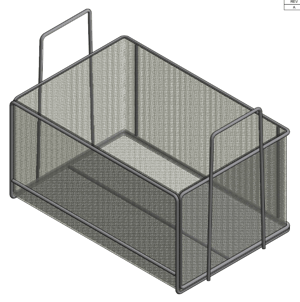 In the food industry, there are often many pieces of food processing equipment that are very difficult and time-consuming to wash manually—especially to get them to the kind of sanitary condition needed for U.S. Food and Drug Administration (FDA) regulatory compliance. To save time and ensure more thorough cleaning for their food processing equipment, many companies in the food industry use specialized “Clean-Out-of-Place” (COP) parts washers to sanitize their hoses, clamps, valves, and other disassembled processing equipment components.
In the food industry, there are often many pieces of food processing equipment that are very difficult and time-consuming to wash manually—especially to get them to the kind of sanitary condition needed for U.S. Food and Drug Administration (FDA) regulatory compliance. To save time and ensure more thorough cleaning for their food processing equipment, many companies in the food industry use specialized “Clean-Out-of-Place” (COP) parts washers to sanitize their hoses, clamps, valves, and other disassembled processing equipment components.
However, while these COP parts washing machines are highly effective at sanitizing food processing equipment, food manufacturers need a way to efficiently introduce parts to the COP machine’s tank and then remove them once they’re clean. Dropping loose parts into the tank would take extra time and effort to fish them back out, requiring manual intervention that takes time—not to mention possibly causing damage to the tank or the parts being cleaned.
To overcome this particular challenge, one food manufacturing company contacted Marlin Steel for a custom food processing equipment washing basket to use with their COP parts washing machine.
Matching the Parts Washing Basket to the Client’s Needs
In this particular food equipment washing process, it didn’t matter how the parts to be washed were held. So long as the water and cleaning solution mixture in the tank could reach inside the various tubes and valves, the layout was unimportant. Also, the parts being washed were all relatively durable, and lacked a “no scratch” requirement.
Because of these facts, and to allow the basket to accommodate a wide variety of part shapes and sizes, Marlin’s engineering team opted for an “open” basket design—one with no dividers to separate each of the held parts. The lack of interior obstructions would allow the wash tank solution to easily reach all of the parts in the basket, and make the basket easy to load.
To further improve the flow of water through the basket, a fine wire mesh was used to form the bottom and sides of the basket. Each of these wires was only 0.047” thick, and was also made from grade 304 stainless steel. The stainless steel wires could easily withstand the surfactants and sterilizing chemicals used in the client’s parts washing process—making the basket one that could withstand years of use.
Because the weight of held parts and their weight distribution would be random from one wash cycle to the next, Marlin’s degreed engineers decided to make the basket strong enough to take several times the maximum weight it would be expected to hold. To accomplish this, the engineering team added a series of 0.25” thick wires to the frame and underside of the wire mesh basket. This helped to reinforce the basket so that it could hold heavier loads and withstand uneven distributions of weight without allowing the wire mesh to bend out of shape.
A large set of handles were added to the basket so employees wearing gloves could easily grab and move the basket into and out of the washing tank.
Building High-Quality Food Equipment Washing Baskets Quickly
Because the client needed their custom parts washing baskets ASAP to fill a sanitation need in their plant, Marlin Steel used virtual physics simulations to test the basket’s design. Using this computer testing, Marlin’s degreed engineers could simulate the effects of a decade or more of use in mere minutes without having to make an expensive and wasteful physical prototype.
Any issues in the design were corrected immediately and the modified design would be tested again. This process of testing and refinement would keep repeating until the design could pass the simulation with flying colors.
Once finalized, the design was passed to the manufacturing team at Marlin’s Baltimore, Maryland factory. From the CAD file, they would program a series of wire bending and welding robots to assemble the components of the basket design.
By using factory automation, Marlin’s U.S.-based manufacturing team could complete dozens of parts washing baskets for the client in mere hours. Also, the precision of manufacturing automation ensured that each and every last basket would meet incredibly tight parts tolerances—from the first basket off the line to the last.
The end result was that Marlin shipped out the ideal custom parts washing basket for the client’s needs in mere days from the start of the design process, helping the client eliminate delays in their own manufacturing process.
Need Quality, Engineered Quick®? Contact the experts at Marlin Steel for a custom basket quote. Or, learn more about food processing baskets by downloading our guide at the link below:



.gif)


